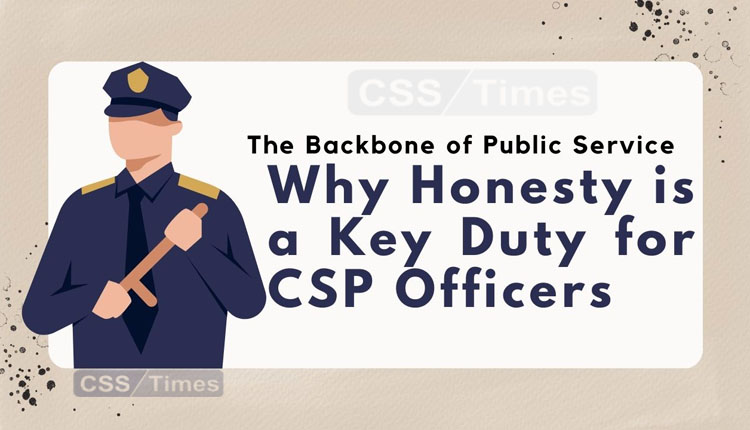The Backbone of Public Service
Why Honesty is a Key Duty for CSP Officers
As public servants, civil servants play a crucial role in ensuring that the government functions efficiently and effectively for the benefit of society. In this regard, honesty is a key duty for civil servants, particularly for those holding the position of CSP (Civil Service Professional) officer. This article will delve into why honesty is crucial to the backbone of public service and how it shapes the role and responsibilities of CSP officers.
The Importance of Honesty in Public Service
Honesty is a fundamental value in any society, and it is particularly critical in the public sector. Public service is based on the principle of serving the people and working for the common good, which requires a high level of transparency, accountability, and integrity. Honesty is the foundation of these principles, and without it, the trust of the public is lost. The public expects the government to be transparent and accountable in its actions and decisions, and they rely on public servants to act with integrity and honesty.
In addition to the public’s expectations, honesty is also essential for the proper functioning of government institutions. Public servants are entrusted with sensitive and confidential information that must be kept secure and used only for the public good. Dishonesty, corruption, or any other unethical conduct can compromise this information, leading to severe consequences such as loss of life, damage to national security, and loss of trust in government institutions. Therefore, honesty is a key duty for civil servants to ensure the proper functioning of government institutions.
Read also: The Top 10 English Grammar Rules You Need to Know
The Role of CSP Officers in Upholding Honesty
CSP officers play a crucial role in upholding honesty in the public service. They are responsible for implementing policies and making decisions that affect the lives of citizens, businesses, and other organizations. As such, they must be held to the highest standards of honesty and integrity. They must not only be honest in their actions but also in their words and interactions with the public.
One of the key responsibilities of CSP officers is to maintain the public trust in government institutions. This trust can only be achieved by being honest, transparent, and accountable in their actions. CSP officers must be open about the decisions they make and the reasoning behind them. They must be willing to answer questions and provide information to the public. By doing so, they can help to ensure that the public understands the government’s actions and decisions, and they can build trust and credibility with the public.
Check also: World General Knowledge MCQs
The Consequences of Dishonesty in Public Service
Dishonesty in public service can have severe consequences for both individuals and society. It can undermine the trust and confidence that people have in government institutions, leading to a loss of faith in the democratic process. It can also lead to a lack of accountability and transparency, which can hinder the effective functioning of government institutions.
In addition to the impact on society, dishonesty can also have personal consequences for civil servants. It can damage their reputation, career prospects, and future opportunities. It can also lead to disciplinary action, including termination of employment and legal consequences, such as fines and imprisonment.
Read also: Why English Precis Writing Matters and How to Improve Your Skills
Challenges to Honesty in Public Service
While honesty is a key duty for CSP officers, there are several challenges to upholding this value in public service. One of the significant challenges is the pressure to achieve targets or meet deadlines, which can sometimes lead to unethical behavior, such as manipulation of data or cutting corners. There may also be a lack of accountability or oversight, which can make it easier for individuals to engage in dishonest behavior without fear of consequences. Additionally, personal or financial interests may sometimes conflict with the public interest, leading to unethical conduct.
Strategies for Upholding Honesty in Public Service
To address these challenges and promote honesty in public service, various strategies can be implemented. One such strategy is to establish a strong code of ethics that clearly outlines the expectations and responsibilities of public servants. This code should be regularly reviewed and updated to ensure that it remains relevant and effective. Additionally, training programs can be implemented to educate public servants on the importance of honesty and how to handle situations where conflicts of interest may arise.
Another strategy is to create a culture of openness and transparency within government institutions. This can be achieved by encouraging feedback from the public and ensuring that public servants are accessible and responsive to inquiries and concerns. The establishment of whistle-blower protection programs can also provide a safe and secure channel for individuals to report misconduct without fear of retaliation.
Read also: Avoiding Common Mistakes in English Precis Writing
Examples of Honesty in Public Service
There are numerous examples of public servants who have demonstrated honesty and integrity in the face of difficult circumstances. One such example is the case of Frank Serpico, a former NYPD officer who exposed corruption within the department. Despite facing threats and intimidation, Serpico refused to back down and continued to speak out against the wrongdoing. His actions ultimately led to reforms within the NYPD and served as an inspiration for other whistleblowers.
Another example is the case of Anna Hazare, an Indian social activist who led a campaign against corruption in the government. Hazare went on a hunger strike to protest against a proposed anti-corruption bill that he felt did not go far enough in addressing the issue. His actions sparked a nationwide movement, and the bill was eventually revised to include stronger measures against corruption.
Final Thoughts
In conclusion, honesty is a fundamental value that is essential to the backbone of public service. CSP officers have a significant responsibility to uphold this value and ensure that government institutions function effectively and transparently. While there may be challenges to upholding honesty in public service, there are strategies that can be implemented to promote and maintain this value. By doing so, public servants can build trust and confidence with the public and help to ensure that the government serves the interests of all citizens.








[…] Read also: The Backbone of Public Service: Why Honesty is a Key Duty for CSP Officers […]
[…] Read also: The Backbone of Public Service: Why Honesty is a Key Duty for CSP Officers […]